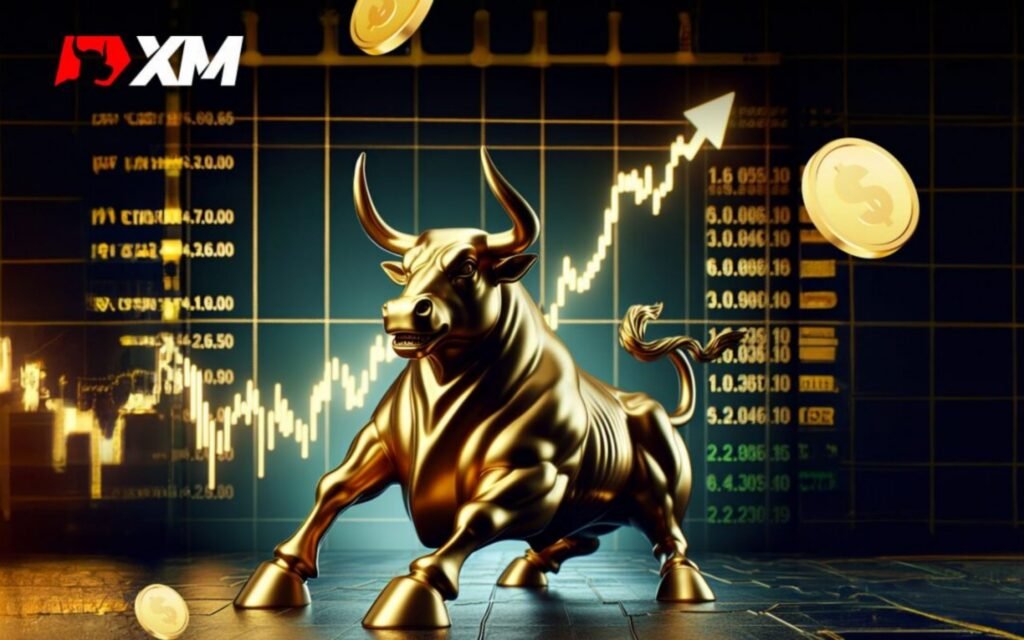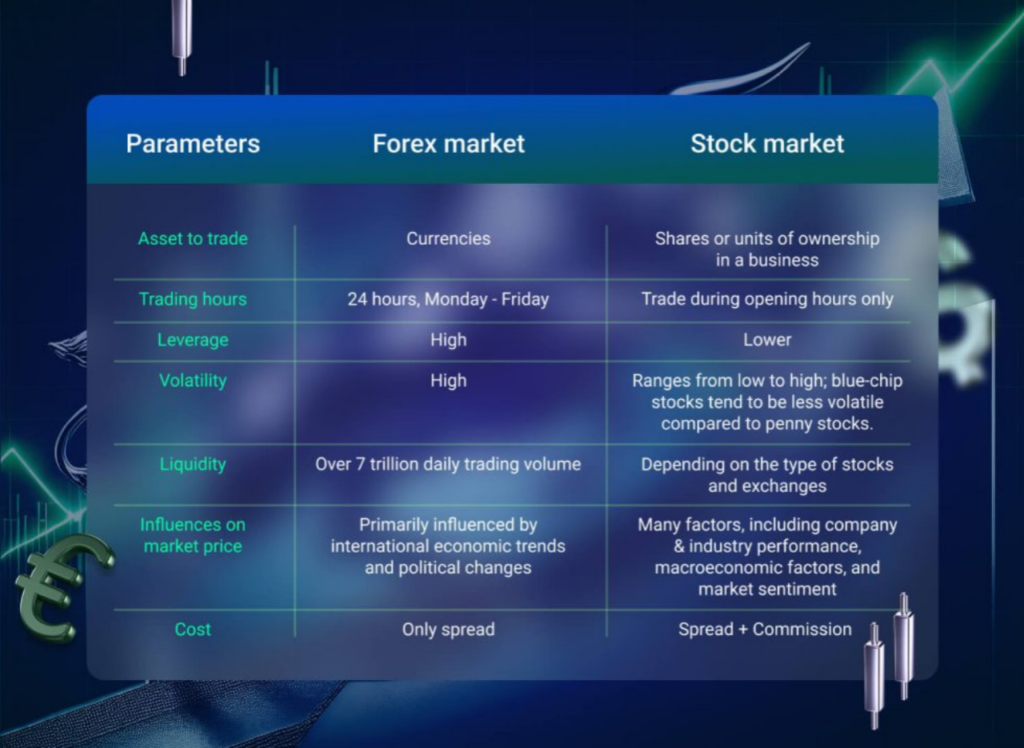
Have you ever wondered why some traders thrive in the forex market while others find their fortune in stocks? Understanding the differences between forex and stock trading is crucial for making informed investment decisions. This article will help you understand the key distinctions between these two markets and determine which option might be better suited to your trading style and goals.
What Is The Forex Market?
The Forex market, or foreign exchange market, is the largest financial market globally, where currencies are traded around the clock, five days a week. Unlike stock markets, Forex trading doesn’t occur on a centralised exchange but operates through a global network of banks, brokers, and traders.
In forex, trading is done in currency pairs, like the EUR/USD, where participants speculate on the exchange rate between the two currencies. This market is known for its high liquidity and volatility, attracting short-term traders who aim to profit from quick price movements.
In forex, trading is done in currency pairs, like the EUR/USD, where participants speculate on the exchange rate between the two currencies. This market is known for its high liquidity and volatility, attracting short-term traders who aim to profit from quick price movements.
XM offers several advantages to forex traders, including various account types-such as standard, micro, ultra-low standard, and ultra-low micro accounts to suit different trading needs. With access to over 50 currency pairs and competitive trading spreads, XM provides a flexible and dynamic environment for forex trading.
What Is The Stock Market?
Stock markets are platforms where shares of publicly listed companies are bought and sold. When you purchase a stock, you’re essentially buying a small piece of that company, becoming a shareholder. As the company grows or earns profits, shareholders may receive dividends. Major stock exchanges like the NASDAQ and the New York Stock Exchange facilitate these transactions, providing a regulated environment for trading.
Stock markets are often favoured by long-term investors who seek to grow their wealth as companies expand and perform well over time. At XM, stock trading is cost- effective and provides direct access to global equity markets, making it a convenient choice for investors looking to diversify their portfolios.
Forex Trading Vs Stock Trading

Forex And Stock Market Trading Hours
Stock market trading hours are typically restricted to the regular business hours of the country where the exchange is located. For example, in the United States, the New York Stock Exchange (NYSE) operates from 9:30 AM to 4:00 PM Eastern Time, Monday through Friday, excluding market holidays.
Similarly, the London Stock Exchange is open from 8:00 AM to 4:30 PM on weekdays, with a brief pause from 12:00 PM to 12:02 PM. These set hours mean that stock trading is limited to specific times, which can be a consideration for traders who want to actively manage their investments.
In contrast, the Forex market offers more flexibility as it operates 24 hours a day, five days a week. The trading week begins on Sunday evening with the opening of the Australian markets and continues non-stop until the New York markets close on Friday. This round-the-clock operation allows traders to participate in the markets at any time, regardless of their location, making it possible to trade during different sessions-U.S., Asian, or European-depending on their schedules. This flexibility is advantageous for beginners and experienced traders alike, offering the ability to trade without being constrained by traditional market hours.
Which Asset To Trade: Forex Or Stocks?
In the forex market, the primary assets being traded are foreign currencies. Traders speculate on how one currency will perform against another, often reflecting the economic health and stability of the respective countries. For instance, a trader might buy Euros while selling US Dollars if they believe the Euro will strengthen against the Dollar. This type of trading requires an understanding of global economic indicators and geopolitical events that can influence currency values.
Platforms like XM offer a wide range of currency pairs, allowing traders to explore different markets and strategies. XM supports trading 24 hours a day, 5 days a week, with leverage up to 1000:1, and features zero swaps on ultra-low standard/micro accounts, tight spreads, and no re-quotes, making it an excellent choice of trading for beginners.
In contrast, the stock market involves trading shares of corporations. When you buy a stock, you become a shareholder and own a small part of that company. Your investment’s value can grow as the company performs well, potentially leading to an increase in stock price and the payment of dividends. This makes stock trading appealing for those looking to invest in a company’s long-term success.
At XM, stock trading is made accessible and cost-effective, providing direct access to global equity markets and a diverse selection of companies to invest in. This can be especially beneficial for beginners looking to invest in company shares while exploring different trading strategies.
Forex And Stock Market Trading Hours
Stock market trading hours are typically restricted to the regular business hours of the country where the exchange is located. For example, in the United States, the New York Stock Exchange (NYSE) operates from 9:30 AM to 4:00 PM Eastern Time, Monday through Friday, excluding market holidays.
Similarly, the London Stock Exchange is open from 8:00 AM to 4:30 PM on weekdays, with a brief pause from 12:00 PM to 12:02 PM. These set hours mean that stock trading is limited to specific times, which can be a consideration for traders who want to actively manage their investments.
In contrast, the Forex market offers more flexibility as it operates 24 hours a day, five days a week. The trading week begins on Sunday evening with the opening of the Australian markets and continues non-stop until the New York markets close on Friday. This round-the-clock operation allows traders to participate in the markets at any time, regardless of their location, making it possible to trade during different sessions-U.S., Asian, or European-depending on their schedules. This flexibility is advantageous for beginners and experienced traders alike, offering the ability to trade without being constrained by traditional market hours.
Trading With Leverage:
Leverage is a powerful tool that allows investors to control larger positions with a smaller amount of money. Essentially, brokers provide a “loan” that increases the size of your trade beyond what your own funds would normally allow.
For example, with a leverage ratio of 10:1, an investment of USD 1,000 can control a position worth USD 10,000. This can significantly boost potential profits, but it also magnifies potential losses, as they are based on the full value of the trade, not just your initial investment. To manage the risk of large losses, brokers may automatically liquidate positions if losses threaten to exceed your account balance.
Leverage is commonly used in both stock and Forex trading, but it is generally more prevalent and higher in the Forex market. Forex traders can often access leverage ratios as high as 30:1 in Europe and 50:1 in the US, allowing them to control substantial positions with relatively small capital. This high leverage can lead to significant gains, but it also means that losses can quickly accumulate, potentially exceeding the initial investment.
Platforms like XM offer leverage up to 1000:1, providing traders with the ability to take large positions while managing risk with various trading strategies. Additionally, XM provides negative balance protection, ensuring that traders do not lose more than their initial investment.
In the stock market, leverage is generally lower, with standard ratios around 2:1. This more conservative approach helps mitigate risks but also limits potential returns compared to Forex trading. For beginners, using lower leverage in stock trading might offer a safer entry point into the markets while learning about different trading strategies.
Volatility:
Volatility refers to the degree of variation in the price of a trading asset over time. In the Forex market, volatility is generally high, meaning currency prices can change rapidly and significantly within minutes. This is largely due to the market’s global nature and the continuous stream of economic news and geopolitical events that affect currency values. High volatility in Forex trading presents both risks and opportunities, as traders can potentially profit from quick price movements if their trading strategies are effective.
In the stock market, however, volatility varies depending on the type of stock. Blue- chip stocks, representing large and stable companies, usually exhibit lower volatility, offering more stability to investors. In contrast, penny stocks, which are low-priced and have smaller market capitalizations, can experience sharp and unpredictable price changes. While the overall stock market tends to be less volatile than the Forex market, periods of high volatility can still occur, especially during major corporate events or economic downturns. For beginners, understanding market volatility is crucial for developing effective trading strategies and managing risk.
Liquidity:
Liquidity measures how easily an asset can be bought or sold in the market without causing a significant change in its price. The Forex market is one of the most liquid financial markets globally, with a daily trading volume of approximately USD 7 trillion.
This high liquidity means that currency trades can be executed quickly and in large volumes with minimal impact on prices, benefiting traders who need to move large amounts of money or trade frequently. XM’s Forex trading platform offers tight spreads and no re-quotes, enhancing liquidity and efficiency.
In the stock market, liquidity varies depending on the specific stock and the exchange it’s listed on. Stocks of large, well-established companies, like NVIDIA, often have high liquidity due to their popularity and substantial daily trading volumes, making it easier to buy or sell shares without affecting the price much. Major exchanges like the NYSE and NASDAQ also contribute to stock liquidity, with billions of shares traded daily.
However, stocks on smaller exchanges or OTC markets can have lower liquidity,leading to larger price fluctuations. For beginners, selecting highly liquid stocks can help in executing trades more efficiently while exploring various trading strategies.
Conclusion
Choosing between forex and stock trading depends on your trading style and risk tolerance. Forex offers high liquidity and flexibility for dynamic traders, while stock trading suits those preferring stability and long-term investments. Whatever your choice may be, ensure that you are well-informed. Platforms like XM support such choices through their various.
Next post :- Best stocks under 500 with strong financials to keep a watch in 2024

